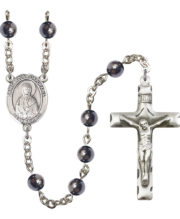Saints
St. Lydia
St. Lydia Biography
St. Lydia was a woman mentioned in the New Testament who is revered as a saint by the Catholic, Orthodox, and Protestant traditions. According to the Bible, St. Lydia was a wealthy merchant who lived in the city of Philippi in modern-day Greece. She is described as a “seller of purple,” which was a type of dye that was highly prized in the ancient world and used to color luxury items such as clothing and textiles.
St. Lydia is best known for her conversion to Christianity, which is described in the book of Acts in the New Testament. According to the Bible, St. Lydia was visited by the apostle Paul, who preached the gospel to her and led her to faith in Jesus Christ. As a result of her conversion, St. Lydia became an influential member of the Christian community in Philippi and is said to have hosted a house church in her home.
Throughout history, St. Lydia has been remembered as a model of faith and dedication to God. She is often depicted in art holding a basket of purple dye, symbolizing her former profession and her commitment to supporting the early Christian Church through her wealth and resources. St. Lydia is the patron saint of textile workers and is remembered by Christians around the world as an example of how God can transform the lives of those who turn to Him in faith. St. Lydia’s feast day is August 3rd.
Popular St. Lydia Medal and St. Lydia Rosary
Detailed Biography of St. Lydia of Thyatira: The First European Convert to Christianity
St. Lydia of Thyatira is a woman mentioned in the New Testament who is regarded as the first documented convert to Christianity in Europe. Several Christian denominations have designated her a saint. In this blog post, we will explore her life, her profession, her faith, and her legacy.
The name, “Lydia”, meaning “the Lydian woman”, by which she was known indicates that she was from Lydia in Asia Minor, a region in modern-day Turkey. She was most likely of Greek background, but romanized, since she lived in a Roman settlement. She was evidently a well-to-do agent of a purple-dye firm in Thyatira, a city southeast of Pergamum and approximately 40 miles inland, across the Aegean Sea from Athens.
Purple dye was a valuable commodity in the ancient world, used for clothing royalty, nobility, and priests. It was extracted from the glands of certain sea snails, and required a great amount of skill and labor to produce. Lydia was a “seller of purple”, which means that she either made the dye herself or sold ready-made dyed fabrics to customers. She had a house in Philippi, a major city in Macedonia, where she conducted her business.
St. Lydia’s Conversion and Baptism
Lydia was a “God-fearer”, which means that she was a Gentile who believed in the one God of Israel, but had not yet become a full convert to Judaism. She attended the Jewish synagogue in Philippi, where she met St. Paul and his companions, Silas and Timothy, during Paul’s second missionary journey. Paul preached the gospel of Christ to Lydia and the other women who gathered there on the Sabbath.
The Acts of the Apostles records that “the Lord opened her heart to pay attention to what was said by Paul” (Acts 16:14). Lydia responded with faith and asked to be baptized along with her household, which probably included her family members and servants. She also invited Paul and his companions to stay at her home, saying, “If you have judged me to be faithful to the Lord, come to my house and stay” (Acts 16:15). She persisted in her hospitality until they agreed.
St. Lydia’s Hospitality and Generosity
Lydia’s home became a base for Paul and his companions during their stay in Philippi. It was also the place where the first Christian community in Europe was formed. Lydia hosted the believers who gathered there for prayer, fellowship, and breaking of bread. She supported Paul’s ministry with her resources and influence. She also showed compassion to Paul and Silas when they were imprisoned and beaten for casting out a demon from a slave girl. She welcomed them back to her home after they were released and cared for their wounds (Acts 16:16-40).
Lydia’s hospitality and generosity were not only acts of kindness, but also expressions of her faith and love for Christ and his church. She was a model of Christian discipleship and stewardship, using her gifts and talents for the glory of God and the service of his people.
St. Lydia’s Legacy and Feast Day
St. Lydia is honored as an apostle, an equal to the apostles, a witness to the faith, and a patroness of dyers. She is also considered one of the four patron saints of Europe, along with Sts. Benedict, Cyril, and Methodius. Her example inspires Christians to share the gospel with others, to open their hearts and homes to strangers, to support the church with their resources, and to care for those who suffer.
St. Lydia’s feast day is celebrated on different dates by different churches. The Catholic Church commemorates her on August 3rd, while the Eastern Orthodox Church celebrates her on May 20th or January 27th (depending on the calendar). On her feast day, we can pray for her intercession and thank God for her life and witness.
Why is St. Lydia the patron saint of textiles?
St. Lydia is considered the patron saint of textile workers because, according to the Bible, she was a seller of purple cloth. Purple cloth was a very expensive and highly prized commodity in the ancient world, and those who sold it were often wealthy and influential. As a seller of purple cloth, St. Lydia was likely involved in the production and trade of textiles, and so she has become associated with the textile industry.
In addition to her connection to the textile industry, St. Lydia is also remembered for her hard work and determination. As a successful businesswoman, she demonstrated a strong work ethic and a commitment to excellence in her work. These qualities, along with her connection to the textile industry, have made her a role model and patron saint for those working in the field of textiles.
Prayers to St. Lydia
Prayer of Intercession to St. Lydia
O St. Lydia, you were a woman of great faith and devotion to God, and you dedicated your life to spreading the gospel and supporting the early Christian Church. Please pray for me that I may also have the courage and determination to follow in your footsteps, and to always strive to live a life of faith and service to others. Help me to turn to God in all things, and to find comfort and strength in His love.
Prayer to St. Lydia
Dear St. Lydia, you were a woman who exemplified the transformative power of God’s love. Please intercede for me that I may also experience the transformative power of His love in my own life. Help me to open my heart to His grace, and to allow Him to work in my life in ways that bring me closer to Him. May your example of faith and dedication inspire me to grow in my own relationship with God, and to serve Him with all my heart. Amen.
Children’s Story about the life of St. Lydia
In a city called Philippi, there lived a woman named St. Lydia. She was a very wealthy woman who sold a special kind of dye called purple, which was used to color expensive clothes and textiles. St. Lydia was a kind and generous woman, and she used her wealth to help others.
One day, St. Lydia heard about a man named Jesus who was teaching about God’s love and forgiveness. She was very interested in what Jesus had to say, and she decided to go and hear him speak. As she listened to Jesus, she felt her heart being filled with love and joy. She knew that Jesus was special, and she decided to follow him.
St. Lydia became a Christian, and she dedicated her life to spreading the gospel and helping others. She used her wealth to support the early Christian Church, and she even opened her own home to other believers so they could worship together. St. Lydia was a woman of great faith, and she inspired many others to follow Jesus.
St. Lydia’s life was a wonderful example of how God can transform the lives of those who turn to Him in faith. She showed us that no matter who we are or what we do, we can all have a close relationship with God if we open our hearts to Him. St. Lydia is remembered as a special saint who helped many people come to know and love Jesus.
Reflection on the Feast of St. Lydia
Today, the Catholic Church celebrates the feast of St. Lydia on August 3rd. The Feast of St. Lydia is a day set aside to honor and remember the life and legacy of this revered saint. St. Lydia is an important figure in the Christian tradition, as she is mentioned in the Bible as one of the first converts to Christianity in the city of Philippi. St. Lydia’s conversion is seen as a powerful example of the transformative power of God’s love, and she is remembered as a woman of great faith and dedication to the gospel.
As we celebrate the Feast of St. Lydia, we can reflect on the ways in which her life and example can inspire us to grow in our own faith. We can consider the ways in which St. Lydia’s commitment to God and to the spread of the gospel can inspire us to be more dedicated to our own faith and to serving others. We can also pray to St. Lydia for guidance and strength as we seek to follow in her footsteps and to live lives that are pleasing to God.
Lessons learned from St. Lydia
There are several lessons that we can learn from the life of St. Lydia:
-
The power of faith: St. Lydia’s conversion to Christianity shows the transformative power of faith. Her encounter with the apostle Paul and the message of the Gospel changed her life forever and led her to dedicate herself to following Christ.
-
The importance of openness to new ideas: St. Lydia was open to hearing the message of the Gospel and was willing to consider a new way of thinking. This openness allowed her to be transformed by the message of Christ and to become a follower of him.
-
The value of hard work and determination: As a successful businesswoman, St. Lydia demonstrated a strong work ethic and determination. She used her talents and resources to support the early Christian community and to help spread the message of the Gospel.
-
The power of community: St. Lydia was not only a follower of Christ, but she also played an important role in the early Christian community. She provided a place for the apostle Paul and his companions to stay, and she helped to nurture and support the growing Christian community in Thyatira.
-
The importance of generosity: St. Lydia was known for her generosity and her willingness to share her resources with others. She demonstrated the importance of being selfless and giving to those in need.
Saints Similar to St. Lydia Purpuraria
You may also be interested in reading the Biography of St. Katharine Drexel. Both St. Lydia Purpuraria and St. Katherine Drexel were known for their charitable works and dedication to helping the less fortunate. St. Lydia was a seller of purple cloth in the Bible, and St. Katherine Drexel was a philanthropist and missionary. Next up: Biography of St. Madeline Sophie Barat
Also check out our handmade St. Lydia Purpuraria Medal and St. Lydia Purpuraria Rosary and St. Lydia Purpuraria Rosary Bracelet .


